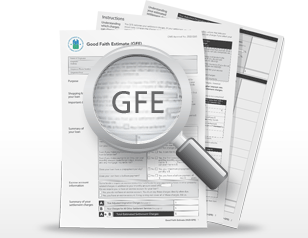If you are considering buying a house, there is a good chance that you are familiar with the term “good faith estimate”. But, if you are inexperienced with buying and selling houses, there is an equally good chance that you do not know exactly what that term means and how it applies to you. The information below will give you a brief overview of everything you need to know about good faith estimates.
What is a Good Faith Estimate?
A good faith estimate is simply the name of a form that a mortgage applicant received from a lender. This form provides an estimate of the loan amount as well as a breakdown of the payments and the associated fees that come with the loan. Good faith estimates allow home buyers to compare the costs of loans from different lenders so they can choose the best deal. Other benefits of a good faith estimate include helping mortgage applicants understand the real cost of the loan and allowing them to make informed decisions about choosing the loan.
The Loan Estimate Form
As of 2015, the good faith loan was replaced by the loan estimate form due to the Truth in Lending Act. A mortgage lender must present a loan estimate form to a loan applicant within three days of receiving a loan application.
The Information Included on a Loan Estimate Form
When you receive a loan estimate form from a mortgage lender, you can expect to find the following information:
- The loan amount.
- The term length.
- Total closing costs.
- Interest rate.
- Tax and insurance costs.
- Any repayment penalties, if applicable.
- Origination charges.
The Purpose of a Loan Estimate
Whether you want to call it a good faith estimate or a loan estimate, the purpose of the document is the same: it helps borrowers avoid overpaying for a mortgage loan. Having the information on the document can help you see if you can afford a larger home and still stay within the budget.
Accuracy of Loan Estimates
If a loan estimate is not accurate, the lender can lose out on money, so when you receive one, you can expect that it will be accurate. Occasionally, there will be extra fees that are not listed on this form because they are split between the buyer and seller.
Effect on Credit Scores
When you get good faith estimates or loan estimates mortgage lenders will look at your credit scores. If you are not careful, your credit score can be negatively affected by the multiple requests. Credit bureaus may mistake the frequent requesting of your scores for denied credit from various lenders. This assumption can lead to the various bureaus lowering your credit score. So, your best bet is to limit your mortgage shopping to no more than 30 days past the first credit pull to avoid an unnecessary hit to your credit score.
Protection for Home Buyers
Getting a loan estimate for a mortgage adds a layer of protection for borrowers. The estimate is written in clear language so the borrows can easily understand the terms of the mortgage for which they are applying. However, borrowers need to be vigilant when they are dealing with mortgage lenders. Although most are honest and forthright, there are some unscrupulous lenders out there who will add fees after the fact or tack on unnecessary “administrative” fees. It is up to you as the borrower to keep an eye out for these lenders so you can protect yourself from being overcharged. Knowing exactly what you will be charged is a great aid in helping you not let yourself be taken advantage of.
Common Terms you may See on a Loan Estimate Form
The following terms will most likely be on every loan estimate form you see. Familiarize yourself with these terms to make sure you understand everything that is spelled out in the document:
- Loan origination fee: The fee for making a loan.
- Appraisal fee: The fee that covers the property appraisal so the value of the home can be determined.
- Processing fee: The fee the lender charges for reviewing your paperwork.
- Underwriting fee: A fee for underwriting your loan.
- Title fees: Fees that pay for the services of the title company to handle the closing on the loan.
- Recording fee: The fee to create the public legal record of ownership of your home.
- Prepaid interest: The interest due on the loan from the date you get the loan to the end of the month.
- Escrow fees: Money held by the lender to pay your future insurance and real estate taxes.
- VA Funding Fee: This fee is exclusive to VA loans. It is a one-time fee that is rolled into the total loan amount.
If you need to sell your house fast before you buy a new one, Ben Buys Indy Houses can take it off of your hands. We will buy your house for cash and have the process done in no more than 30 days. Once you have your money, you can put it toward the mortgage on your new home, make changes to personalize your new home, put it in the bank or simply put it in your pocket. The choice is yours.





